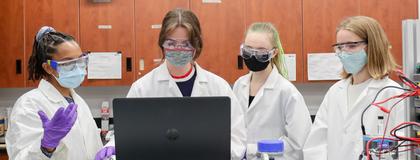
Physics Co-op Information for Employers
Adding Value to Your Team
Physics is concerned with the fundamental studies of the interaction of matter, from the sub-atomic to the astronomic. Students study the basic building blocks of matter and how the four fundamental forces of nature explain the universe. Students use computer technology to investigate probes such as nuclear magnetic resonance, X-ray and nuclear scattering. The study of molecular, nuclear, and condensed matter physics, using principles of quantum mechanics and thermodynamics, is central in the physics curriculum at Guelph.
University of Guelph Advantage
The University of Guelph Physics department has an international reputation for excellence in research. Grants awarded to faculty have been higher than the national average for over a decade.
Five Faculty members have been named Fellows of the Royal Society of Canada.
Our co-op process responds to your needs. Employers can post, interview and hire throughout the semester and our students are available for 4 or 8 month work terms. The Experience Guelph hiring tool makes hiring Guelph co-op students easy!
Student Strengths
Solid Foundation
By the first work term, students are competent in basic mechanics, electricity and magnetics; and have scientific programming and desktop computing skills.
Advanced Knowledge
As students begin the second and third work terms, they have added wave theory, circuit theory, electronics, and optics to their repertoire. And by their final work term, students are experienced in electromagnetic theory, statistical physics, quantum mechanics, wave propagation and thermodynamics.
Problem-Solving
Students have developed excellent communication and problem-solving abilities.
Physics Co-op Work Term Schedule
| YEAR | FALL | WINTER | SUMMER |
|---|---|---|---|
| ONE | Academic | Academic | Off |
| TWO | Academic | Academic | Work |
| THREE | Academic | Work | Work |
| FOUR | Academic | Academic | Work |
| FIVE | Work | Academic |
Physics Course Sequencing
Please see the current undergraduate calendar for more information.
Fall
- General Chemistry I
- Programming
- Integrated Mathematics and Physics I
- One of:
- Discovering Biodiversity
- Biological Concepts of Health
- Introduction to Molecular and Cellular Biology
Winter
- General Chemistry II
- Integrated Mathematics and Physics II
- Linear Algebra I
- One of:
- Discovering Biodiversity
- Biological Concepts of Health
- Introduction to Molecular and Cellular Biology
Fall
- Advanced Calculus I
- Thermal Physics
- Electricity and Magnetism I
- Introduction to Co-operative Education
- Applied Differential Equations
- 1 Liberal Education elective
Winter
- Experimental Techniques in Physics
- Mechanics
- Electricity and Magnetism II
- 1 elective
- One of:
- Intermediate Programming
- 1 elective
Summer
Work Term One
Fall
- Science Communication
- Mathematical Physics
- Quantum Mechanics I
- Advanced Mechanics
- 1 elective
Winter
Work Term Two
Summer
Work Term Three
Fall
- Advanced Electromagnetic Theory
- One of:
- Data Structures
- 1 elective
- One of:
- Statistical Physics II
- 1 elective
- 2 electives
Winter
- Computational Methods in Materials Science
- Intermediate Laboratory
- Quantum Mechanics II
- One of:
- Complex Analysis
- 1 elective
- Optics: Fundamentals and Applications
Summer
Work Term Four
Fall
Work Term Five
Winter
- Advanced Physics Laboratory
- One of:
- Subatomic Physics
- 1 elective
- One of:
- Solid State Physics
- 1 elective
- 2 electives
